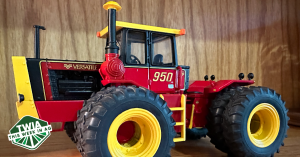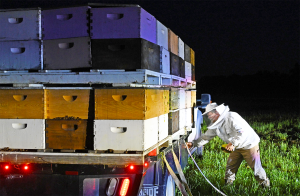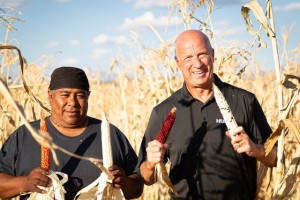While farmer sentiment may be down, their appetite for new information is not. Initial estimates had last week’s Commodity Classic drawing record crowds, with projections of 11,000 attending the event in Houston. It’s nearly impossible to upstage John Deere at such an event, and big green’s launch of four new products stole the headlines. Their green beanies featuring the new 830-horsepower tractor were highly sought after. Stretching across their entire booth was a new 850-bushel air seeder attached to the 9RX tracked-tractor. Upon seeing it on display, farmers friends and I joked about the prospect of even roading such a monstrosity down small and winding roads. In talking to a friend who is editor of a prominent farm magazine, I asked what stood out to him (other than the green machines) at the show. He said the attention and interest in biological products was his key takeaway. In listening to commodity association leaders and the USDA Ag Secretary, aviation fuel is an exciting market opportunity. Yet to the chagrin attendees, no official announcement on SAF was made. The Secretary did say that details would be released in a matter of weeks, not months. Talk of the Farm Bill was heard throughout the week, but few have much confidence in much happening until after the election. Crop insurance continues to be the top priority. When legislation finally comes to the floor, there will be over 400 congressmen who have never voted on a Farm Bill. Overall, low commodity prices and high input prices had farmers searching for solutions.
This was the first year for Huma to display our new brand at Commodity Classic. We seemed to make quite a splash with our attention-grabbing booth. There was a steady flow of interested visitors, especially on the first day. We received strong praise from both friends and newcomers. There seems to be a growing interest in humics and what they can offer. Knowledge varies, but minds appear open. We fielded lots of questions on improving soil health, managing manure, utilizing in-furrow application and replacing synthetic products. We even got questions about using liquid products with drones.
Few brands in history have risen to dominance like Toyota. In 1986, the Japanese automaker became the first foreign brand to sell over 1 million cars in the US. By 2008, it took over the top spot in America. And the past four years running Toyota is number-one in the world. Reliability and quality are hallmarks. But their long-term vision and insight into customer preferences have made them legendary. They seem to know things their competitors don’t. Perhaps this is the case with electric vehicles. Many are predicting the demise of the internal combustion engine. But not Toyota. Chairman Akio Toyoda doubled down on his belief that EV cars will max out at 30% of the US market (some European markets have surpassed 30%). He believes the future is in hybrid models, which combines reliability with fuel-saving capabilities. This position is not popular with some climate advocates, who view EV as a singular approach to meeting their goals. However, Japan is the only developed nation to lower carbon emissions by 23%, largely due to hybrid vehicles which account for over half of the country’s auto sales. One group that is lauding Toyota’s strategy is corn growers. Hybrid vehicles provide a continued market for corn-based ethanol, which serves as the destination for 38% of US corn production.
Our hearts go out to ranchers and farmers across the Texas Panhandle who are experiencing catastrophic losses. More than 1.1 million acres have been burned by wildfires. Winds continue to whip the blaze across dry grasses, as only 15% of the fires have been contained. Thousands of cattle have perished, which will further lessen the shrinking US herd, already at a 70-year low. Momma cows are valued at about $3,000 a piece. Then there’s the structural damage. A mile of fence can cost more than $10,000 to replace. Supplies of hay and feed have been ravaged, as have growing wheat crops.
Related Posts

This Week in Ag #80
Memories awoke recently when I added a Versatile 4WD to my toy tractor collection. It’s a relic of a by-gone era, when thick clouds of smoke bellowed across the Prairies and Plains as steel blades turned the soil. In the 1970s, high horsepower 4WD tractors were all the rage in the Midwest. And our western

This Week in Ag #38
When you’re carving your Halloween pumpkins this week, be sure to thank a bee. That’s because pumpkins are not self-pollinating plants. Unlike cotton and soybeans, where pollen produced within a flower fertilizes the ovary of the same flower on the same plant, pumpkins have specific male and female flowers across their vines. So they need bees to carry pollen between the flowers. Pumpkin growers will rent bee colonies during the growing season to ensure better pollination and higher yields.

This Week in Ag #41
This is American agriculture’s big week – Thanksgiving! Our celebration of food takes center stage on family dining tables from sea to shining sea. Not only do we honor the 1% who currently feed us, we also reflect upon the many contributions of the original American agriculturalists, our Native Americans. For starters, they saved the Pilgrims from starvation during their first years in the New World. The Wamponoag tribe utilized their famous “Three Sisters” cropping practice: corn, beans and squash.

